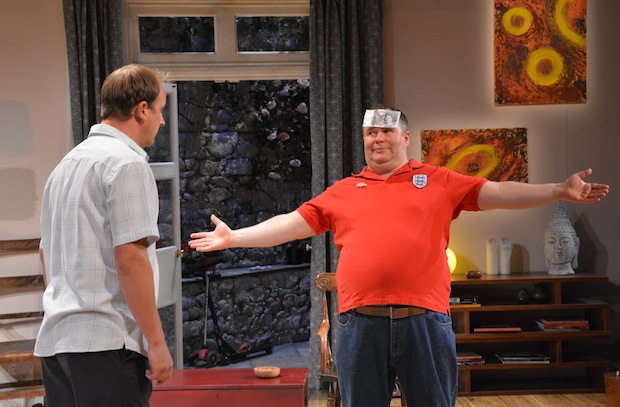Torben Betts, head boy at Alan Ayckbourn’s unofficial school of apprentices, has written at least a dozen plays I’ve never seen. Invincible, my first encounter with the heir apparent, is a sitcom that pitches London snobs against northern slobs. The script is fascinating because it demonstrates, in concentrated form, the limitations of the Ayckbourn method and the narrowness of his psychological palette. The characters are emanations of tribal prejudices rather than flesh-and-blood human beings.
The plot begins with two earnest Islington prigs moving ‘up north’ after losing money in the recession. Where exactly ‘up north’ is unclear but the accents suggest Blackburn. The pair could win prizes for ghastliness. He’s a stammering emotional eunuch. She’s a hectoring Marxist nightmare. They decide to invite their northern neighbours around for a drink even though they hate northerners, even though the neighbours’ cat has vomited on their herb garden and, yes, even though they don’t drink. Enter the slobs. He’s a sumo-sized Little Englander,
whose specialisms include working as a postie, extolling the heroics of Our Boys, and turning Carlsberg into fertiliser. She’s a simpering sun-kissed sex-bomb with an IQ slightly larger than her waist measurement. The chief difference is that the slobs are decent, honest simpletons while the snobs are shifty, self-loathing hypocrites.
An evening of contrived awkwardness ensues. And it’s awkward because Betts forces his characters to meet only at the intersections of long-standing social anxieties. In real life, these mismatched couples would skip effortlessly past the cultural minefields and find common ground in the safe topics of childcare, primary schools or ageing parents. Instead, the radical Islington shrieker gives the slobs a lecture on the joys of communal living, and scolds them for allowing Sky Sports to soak up time and energy that would be better spent on revolution. Even in Ruskin’s age, this character would have stretched credibility. Today it induces cold indifference because it’s composed entirely from mummified platitudes.
The plot moves on. A pet dies; love blossoms between north and south; a close relative of the slobs gets shot in Afghanistan (although recent troop withdrawals make this passage feel prematurely dated). And Betts keeps plugging away at his binary social analysis: the rich are clever and nasty, the poor are thick and sweet. The script is brightened by a great scene which employs a trusted Ayckbourn trick: misinterpreted dialogue. One couple think they’re discussing a buried cat, the other that they’re talking about an adulterous liaison. It works brilliantly, for about six minutes, and if Betts could sustain that level of comic inventiveness for two hours he’d be the new Noël Coward.
The old Noël Coward is on show at the Finborough which presents Britain’s first ever professional production of This Was A Man. Coward wrote the piece in 1926 and the Lord Chamberlain promptly tied a gag around it and sent it packing. A successful production opened in New York and the play toured Europe, and various parts of the empire, to great acclaim.
The setting is Mayfair and we meet a group of glamorous flappers led by Carol, whose countless affairs are causing distress to her wimpy husband, Edward. His best friend, Evelyn, a brusque handsome soldier, tells Edward to bring Carol to heel but when Edward declines Evelyn decides to ‘read her the riot act’ over a private dinner. The meeting turns into a delicately torrid flirtation whose complexities and sinuous self-deceptions swiftly multiply.
Director Belinda Lang captures the mood of the 1920s perfectly without ever straying into mannerism or parody. And she gets the emotional atmosphere right. This isn’t a comedy, and the actors don’t play it that way, it’s an intricate beat-by-beat analysis of a forbidden affair between two parties whose passion is fuelled by suppressed sado-masochism. Coward’s grasp of heterosexual romance can sometimes seem a little uncertain but here he guides us with astonishing acuity and intelligence through the shadowy byways of the human heart. The plotting is as subtle and unpredictable as anything he wrote and his emotional honesty carries a potent foretaste of Pinter. Designer Simon Kenny handles the Finborough’s tiny stage with great economy and creates a spare and stylish set.
Dorothea Myer-Bennett smoulders and schemes wonderfully as Carol. The brilliant Robert Portal brings a touch of Oliver Reed to the stiff but dashing Evelyn. And Georgina Rylance is exquisitely chilly as a gorgeous divorcee who stalks the fringes of her best friends’ marriage hoping to batten on the leftovers. This is a miraculous discovery. Queues of directors will be itching to give the script a second outing. And queues of producers will be competing to send this excellent production out on tour. A word of warning. The Finborough is small and steamy. Dress for the tropics.







Comments